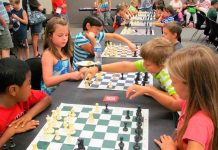Конспект урока для 10 класса «Роль компьютера в обучении. Обсуждение важности информационной компетенции и компьютерной грамотности»
Образовательная цель- обучение основам написания аргументативного эссе на основе материала учебника.
Воспитательная цель- воспитание коллективизма; развитие самостоятельности и самоконтроля; развитие умения распределять свое время; развитие инициативы и ответственности.
Развивающая цель- развитие аналитического и критического мышления.
Задачи урока:
-
Введение и отработка новых лексических единиц (be cheated out of, challenge smb., date, be outdated, up-date, up-to-date, jog one’s brain, mind-expanding, rely on, solve a problem, solution;
-
Развитие монологической речи;
-
Развития умения чтения с полным пониманием;
-
Обучение средствам логичной связанности в тексте (на примере текста);
Используемые материалы: учебник New Millenium 10, книга для учителя, доска, карточки.
Ход урока:
| Деятельность учителя | Деятельность учащихся | Время | Комментарии | |
| 1.Оргмомент | Good afternoon. Yesterday I heard that a new generation of computers has been invented recently. Have you heard anything about it? I think development of new types of computers is a sign that they’re of great importance in the modern world. Don’t you think so? I think you’ve already guessed what we’re going to speak about today. Of course, we are going to speak on the topic “Computerised education”. We’re going to discuss the role of computers in the modern education, find out your personal opinions on this topic, find the ways of expressing your opinions and get acquainted with the structure of argumentative essay. | Good afternoon.
Yes, we’ve heard. It’s a new generation of map case computers.
Yes, we think they’re very important today. | 3мин | Оргмомент направлен на концентрацию внимания учащихся, знакомство с целями и задачами урока, вхождением учащихся в языковую среду. |
| 2.Речевя зарядка
| Now let’s answer 3 key questions on the role of computers in our everyday life altogether. First of all let’s state in what spheres of life computers can be helpful. А)Continue the sentence using your ideas: Computers help us to…
В)Thank you very much. And now answer my questions, please, to find more about the role of computers in education: 1)In what school subjects can be computers especially important? What for?
2)In what areas of your studies can you easily do without computers? | ST.1: Computers help us to communicate with people who live far away. ST.2: Computers help us to find different information. ST.3: Computers help us to entertain. St.4: Computers help us to study and work at home.
St.5: Computers can be especially important in IT, because this subject can’t be taught without computers. St.6: Computers can be especially important in maths because you can coun faster with the help of computers. St.7: Computers can be especially important in history because you can find extra information in the Internet. ST.8: I think we can easily do without computers in chemistry and biology.
| 5мин | Речевая зарядка направлена на углубление основной идеи данной лексической темы, активизацию внимания учащихся по изучаемой теме, на создание рабочей, но, в то же время, дружеской атмосферы. У учащихся высоко развиты мыслительные способности, они активны, но привыкли на уроках работать в духе «свободного общения» с учителем, поэтому на данном этапе урока им предложено задание в вопросно-ответной форме по ключевым моментам темы, в котором может принять участие каждый и выразить свое мнение по поставленному вопросу. На данном этапе урока используется фронтальная форма организация работы учащихся. |
| Фонетическая зарядка (новая лексика из упр.2 с.130) | Now look at the blackboard and read the words in chores after me. Pay attention to the pronunciation of the words. (Convenient, solution, cheat out of, mind expanding, challenging, to jog brain, fundamental, outdated). | Read the word in chores. | 2мин | Отработка произношения новых слов, встречающихся в тексте. Предложенном на следующем этапе урока. Данное задание призвано отработать фонетику, включающую в себя нормы ударения и произношения. |
| 4.Предтстовый этап. Введение и отра-ботка новых лексических единиц (№2A,p.130) | a) We’ve got acquainted with the pronunciation of the new vocabulary with which we’ll deal during the whole class. Now open your books at p.130 ex.2a and try to guess the meaning of these words through the context. Read the sentences one by one and find in the box the Russian equivalents for the words and phrases in bold.
b)Now you’ll receive the task on the cards. There are two variants. Divide, please, into pairs and fill in the gaps with one of the words or phrases from the box. First two pairs from different variants will receive marks. Now the first two pairs will announce correct answers. | Read and translate the sentences and say: ST.1: convenient means удобный; ST2: solutions means решения; ST3: rely on means полагаться на что-либо; ST4: cheat out of means лишить при помощи обмана; ST5: mind—expanding means опыт, расширяющий умственные горизонты; ST5: challenging means проверить использовать свои умственные или физические возможности; ST6: jog brain means тренировать мозг; ST7: fundamentals means основы ST8: rank means быть важнее, чем что—то другое; ST9: outdated means устареть.
Divide into pairs, fulfill the task. First two pairs give their works for check. They announce correct answers for the whole class ( V1: (1)-convenient,(2)-solution, (3)- rely,(4)-a mind expanding experience, (5)- to jog his brain; V2: (1)-cheat out of, (2)-challenge, (3)- outdated, (4)- fundamentals, (5)-rank higher. and receive the marks.
| 8 мин | На данном этапе вводится и отрабатывается новая лексика, которая затем будет использована на текстовом этапе. При введении новой лексики используется частично-поисковый метод, который позволяет учащимся самостоятельно выявить значения новых лексических единиц, при фронтальной организации деятельности учащихся. Синтетический подход (через контекст), применяемый при введении новых лексических единиц, позволяет развивать у учащихся языковую догадку.
При отработке новой лексики реализуется индивидуализировано-групповой подход с элементами соревнования. Данный подход позволяет учащимся с одной стороны работать в индивидуальном режиме и лучше усваивать учебный материал, с другой стороны способствует развитию коллективизма и повышению учебной мотивации. На данном этапе осуществляется также развитие самоконтроля, т.к. учащиеся самостоятельно проверяют задание по ключам, которые объявляют одноклассники. |
| 4.Текстовый этап. Развитие умения чтения с полным пониманием. (№2В) | Now we’re going to get acquainted with an opinion essay. Read, please, the essay about computerized education on p.130-131ex.2B, decide which of the statements is the closest to the author’s opinion and decide whether the sentences on the supplement list are true or false. You don’t need to understand every word. You have 8minutes for this task. Have you finished? What statement have you chosen? Do you have other variants? The right answer is b. Now let’s check your answers on the list. Who wants to check his answers? | Read the essay, choose the statement and make the task.
ST1: I’ve chosen statement b. ST2: I’ve chosen statement a. One student announces his answers. The whole class with the help of the teacher checks their answers. The student receives the mark.
| 12мин | На данном этапе реализуется развитие самостоятельности учащихся, умения организовывать свое время. Языковое упражнение невербального характера (TF) позволяет проверить учителю глубину понимания прочитанного текста. |
| 5. Развитие умения написания эссе. Знакомство и отработка средств связи в эссе. (№2С, р.131) | А)Now let’s look at the essay on p.130-131 once again. Read and translate the highlighted phrases which help to state your opinion when you write an argumentative essay one by one.
В) Now answer the question on p.131 ex.2E. Who knows the right answer raise your hands, please. Take the notes of the right answers.
С) Now let’s find which pluses and minuses computerized education has. Divide into 2 groups. The first group will support computerized education, the other give arguments against it. Group which states more arguments will win. Start, please, to give your arguments. Use the phrases we’ve learned to state your opinions. Now stop, please. The group…has stated more arguments and they’ve won their argument.
| Read the phrases and translate them into Russian: I find it humorous that- я нахожу забавным, что… Yet, it’s true that— однако, верно, что For example- например, But I often feel- но я часто чувствую I am sure that – я уверен, что I don’t believe – я не верю There is no doubt that- нет сомнения, что But along with— но вместе с тем In all – в общем Besides— кроме того Students raise their hands and announce the answers: 1. I find it humorous— opinion; This doesn’t mean— stating the problem, Yet, it’s true— opposing argument 2.As everything becomes more complex…is the topic sentence In my math class— illustrating; For example, … indicates it. 3,4. Using the Internet for research, which the author considers reasonable, is opposed to reading classics on-line. Heshe finds it stupid. 5,6,7.These paragraphs are based on contrasting ideas. I am sure that I don’t believe that… There is no doubt that… are used to state opinion
However,… But I often feel that… But along with to bring in a contrastive idea 8. Besides,…is used to add a new idea In all…- to summarise, restate the opinion. State their arguments for and against computerized education. (The number of “for” and “against” writes the teacher on the blackboard. | 10 мин |
В) Выполнение данного задания осуществляется в групповой форме работы, т.к. оно достаточно сложное и требует коллективного обсуждения ответа.
Прежде чем предложить детям на самостоятельную работу дома письменное речевое упражнение, в классе выполняется подобное упражнение в устной форме и использованием вводных фраз. Используется групповая форма работы, т.к. данный урок способен подвести итоги по пройденной теме и подготовить учащихся к написанию контрольного аргументативного эссе по изученной теме. Групповая форма работы направлена на развитие умения работать в коллективе. Соревновательный характер задания поддерживает инветаризационную мотивацию ( использование как можно больше изученных слов) и эстетическую мотивацию ( испытывать радость от возможности выразить в полном объеме мысли по пройденной теме).
|
| 6. Подведение итогов и объяснение дз | Thank you for your hard work. At home you fill the chart on p.132 ex.2F, stating your own arguments for and against computerized education and compose as many contrastive statements as you can in ex.3B on p.132. Marks for the lesson are… The lesson is over. Good-bye. | Good-bye. | 5мин | Данный этап урока направлен на подведение итого урока и объяснении дом.задания. Выполнение домашнего задания позволяет учащимся подготовиться к написанию аргументативного эссе на следующем уроке, введению учащихся в письменную речь. Кроме того данное творческое задание помогает учителю поддерживать коммуникативный тип мотивации. |
Variant 1
-
Electronic encyclopedia is very (1)… . You can find a lot of information with a click of the mouse.
-
Finally we found a very good (2)… to our problem.
-
Of course, I will help you. You can (3)… me.
-
Travelling is (4)… as you can learn many new things about people’s lives in other countries.
-
Although my grandpa is eighty he likes to do maths problems (5) … .
-
Solution fundamentals outdated convenient rely on
to jog his brain cheated out of challenge ranks higher
a mind-expanding experience
Variant 2
-
They (1) … the old woman …her money by making her sign a document she didn’t understand.
-
I (2) … you to race me across the lake. I’m sure I’ll win!
-
This model I too (3) … . Nobody will use it any more.
-
Maths, reading and Russian are (4) … in Russian schools.
-
Human life (5)… then any technological achievement.
-
Solution fundamentals outdated convenient rely on
to jog his brain cheated out of challenge ranks higher
a mind-expanding experience
Decide whether the sentences are true or false?
-
Buying a stamp and an envelope and finding time to make a trip to the
post office is not a s convenient as clicking the mouse. T F
-
As everything becomes more complex, the solutions of the problems are becoming more complicated too. T F
-
When I am assigned a paper first of all I look in a computer
encyclopedia. T F
-
Such methods of research are more complicated. T F
-
American students are the best in the world. T F
-
When I use the computer I fail to jog my brain. T F
-
There are many businesses that don’t use computers. T F
-
Computers will outdate and new technology will take their place. T F





